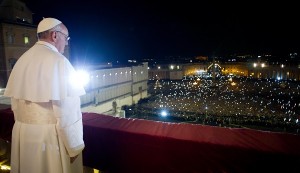Pope begins to outline vision for Catholic Church

In this photo provided by the Vatican newspaper L’Osservatore Romano, Pope Francis looks at the crowd from the central balcony of St. Peter’s Basilica at the Vatican, Wednesday, March 13, 2013. AP FILE PHOTO
VATICAN CITY- Pope Francis begins his papacy in earnest on Sunday ahead of his formal inauguration mass, with a weekly prayer address used by previous pontiffs to comment on international affairs.
The pope’s first Angelus prayer, delivered from a window high above St Peter’s Square, is a chance for the first Latin American pontiff to begin to sketch out a more global vision for the role of the Roman Catholic Church.
City authorities are expecting around 200,000 people to turn out. The 76-year-old pope has already been winning hearts with an informal style markedly different from that of his more austere predecessor Benedict XVI.
A million people may attend the pope’s inauguration on Tuesday, including world leaders who are set to begin flying into Rome on Sunday.
Among them is Argentine President Cristina Kirchner who had tense relations with the former archbishop of Buenos Aires, Jorge Mario Bergoglio, before his surprise election on Wednesday to lead the world’s 1.2 billion Catholics.
Article continues after this advertisementUS Vice President Joe Biden was also due to arrive later on Sunday.
Article continues after this advertisementFrancis has already spoken to Catholic leaders about the need for spiritual renewal and evangelisation and cautioned them against worldly glories, as well as calling for a “poor Church” that should be closer to ordinary people.
He warned cardinals that the Church would fall apart “like a sand castle” if it did not have a solid spiritual foundation and urged them to share their wisdom — “good wine that gets better over the years” — with young people.
At the same time, Francis has faced accusations at home that he failed at the time to speak out against brutalities committed during the years of the military junta in Argentina (1976-1983) when he was head of the country’s Jesuits.
The Vatican has firmly rejected claims that he did not intervene when two Jesuit priests were tortured by the dictatorship, saying the allegations were part of a leftist, anti-clerical campaign.
The Argentine judge who investigated the case, German Castelli, also came out in support of the pope on Saturday saying that prosecutors had found that Bergoglio had “no case to answer”.
But the Grandmothers of the Plaza de Mayo organisation, founded to help locate children who were kidnapped during the military era, lambasted the new pope.
“He has never spoken of the problem of people who had disappeared under dictatorial rule,” said Estela Carlotto, the head of the group, whose daughter Laura was abducted and killed.
— ‘A poor Church for the poor’ —
The criticism has failed to dampen enthusiasm for the new pope in Rome, where Vatican media workers whooped “Long live the pope!” at an audience on Saturday where Francis explained how he chose his new name.
He revealed that when the cardinals elected him at an emotional conclave, he had been sitting next to Brazilian Cardinal Claudio Hummes.
“He hugged me and kissed me and told me not to forget the poor. And that word went in here,” Francis said, pointing to his head. “I immediately thought of Francis of Assisi.”
“How I would like a poor Church for the poor!” said the Argentinian, the first non-European pontiff in nearly 1,300 years.
Hummes meanwhile urged Francis to move immediately to reform the Roman Curia — the intrigue-filled central administration of the Church which has faced growing criticism in recent years.
“Reform should begin with choosing the right people for the orientation of the Church that the pope wants — a missionary Church with more dialogue,” Hummes said.
Vatican watchers are keeping a close eye on nominations to top posts as an indication of what changes in substance his papacy could herald.
The Vatican has said Francis will meet next Saturday with his 85-year-old predecessor Benedict, who last month became the first pope to resign for 700 years because he said his physical and mental strengths were failing him.
The resignation brought to an abrupt end a troubled eight-year papacy that was often overshadowed by scandals including the ongoing denunciations of hushed-up sexual abuse of children by paedophile priests stretching back decades.
Catholics have also been abandoning churches in huge numbers in an increasingly secularised West. Even in Latin America, where 40 percent of the world’s Catholics live, the Church is facing competition from evangelicals.
The son of an Italian emigrant railway worker, Francis is a moderate conservative who is unlikely to change key doctrine but experts say that he could push for more social justice and a friendlier faith.